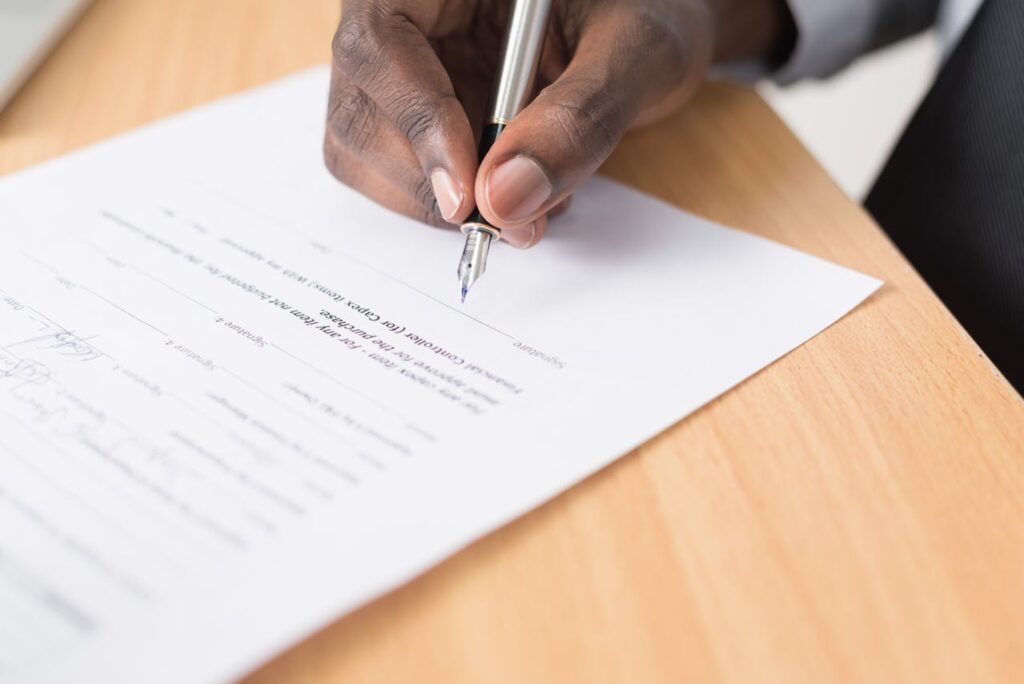What Happens to a Director of a Company in Liquidation?

One of the primary benefits of forming a limited company is the protection from personal liability it offers Directors and shareholder owners.
However, “limited liability” does not provide Company Directors immunity from personal consequences — particularly in the event of a company striking off or liquidation.
If you’re a Director or shareholder owner whose company is facing liquidation, it’s essential to understand the limits of your protection against personal liability.
Read on to find out more — or consult Helix Law’s Commercial Litigation Experts today.
How Does Liquidation Impact Company Directors?
If your company faces persistent cash flow issues or is unable to service its debts, liquidation — or “winding up” the business — may be the best (or only) option. We get involved in either protecting companies being threatened with insolvency and/or winding up, or doing the threatening ourselves on behalf of creditor companies and individuals owed money.
Entering liquidation can be a voluntary decision, but it can also be mandatory if the company’s creditors have grounds to seek the business’s winding up.
We often find insolvency is threatened where actually it isn’t appropriate — say where there is a dispute.
There are three distinct types of liquidation:
- Creditors’ Voluntary Liquidation (CVL): The company is insolvent. You work with your creditors and an insolvency practitioner to liquidate its assets to satisfy at least a portion of company debts
- Members’ Voluntary Liquidation (MVL) – The company is solvent, but 75% of shareholders vote to wind up the business
- Compulsory Liquidation: The company can no longer pay its debts (minimum £750), and 75% of shareholders agree to apply for liquidation
CVLs and MVLs require the consent of directors and/or a majority of shareholders. Each option provides directors more control over the liquidation process than compulsory liquidation.
Unpaid creditors and suppliers, or government authorities like the HMRC, can also seek compulsory liquidation.
Generally, directors are not personally responsible for company debts.
But there are notable exceptions.
Companies that are unable to satisfy outstanding debts are subject to investigation by a licensed insolvency practitioner.
As a company director, you (and any other directors) have a responsibility to minimise the losses to creditors when the business becomes insolvent. If company directors have acted without realising the risk of later insolvency risk to the company, they may have knowingly or unknowingly exposed themselves to risk of personal claims against themselves.
In the real world, this means that before considering or committing to insolvency you should seek advice. If there is no dispute regarding company liabilities it might be that this advice is best obtained from an insolvency practitioner (IP), but if there is concern the company is being unfairly threatened or embroiled in litigation, or the directors wish to know their own personal position, that is advice we can assist with, and is a situation we frequently encounter. We also have connections with professionals who can help as/when needed.
Helix Law are not licensed insolvency practitioners, but we have extensive experience working with trusted professionals to protect your interests.
In the event of insolvency and subsequent liquidation, the actions of directors and shareholder owners will be investigated.
Company directors have defined legal duties to protect the interests of creditors and must act with due diligence when operating the business.
The primary factors that can trigger personal liability are as follows:
- Continuing to trade after you (or any of the other directors/shareholder owners) know (or should have known) that the company is facing insolvency
- Wrongful trading or ‘trading irresponsibly’ under the terms of the Insolvency Act 1986, Section 214
- Fraudulent trading
- Misfeasance or breach of director’s duties
- Compensation orders
The liquidator — an insolvency practitioner (IP) or official receiver (OR) — will examine the company’s affairs and director’s actions to determine if there were any ‘antecedent transactions’ that ‘pierced the corporate veil’, opening company directors to personal liability.
Common examples of antecedent transactions or actions that can expose you to personal liability include:
- Overdrawn director’s loan accounts
- Undervalued transactions
- Preferential payments
- Unlawful dividend payments
- Personal guarantees made by directors to banks and suppliers
- Fraud or misrepresentation when applying for credit
- Failure to keep accurate records
In short, any action or inaction by you, another director, or shareholder owner of the company that unlawfully disadvantages creditors can expose you to personal liability.
We often use the above to put companies and creditors under pressure to seek agreement with us on behalf of our clients as early as possible in a dispute. There can often be a misconception that insolvency will be the end of everything- it may not be.
Can a Director Resign From a Company in Liquidation?
Yes, you can resign from a company in liquidation.
However, resignation does nothing to protect you from personal liability for any misfeasance committed prior to insolvency and liquidation.
It also doesn’t free you from any obligations such as personal loan guarantees or overdrawing money from the company.
Will I Be Investigated if My Company Goes Into Liquidation?
Yes. You and any other individuals who have held directorships during the previous three years will likely be questioned by either the appointed insolvency practitioner or the official receiver.
Typically, you will be asked to complete a questionnaire followed by an in-person interview.
In compulsory liquidation proceedings where a creditor owed £750 or more has served a winding up petition, the actions or inactions taken by directors will be examined closely.
If you do receive a winding up petition, it’s essential to take expert legal advice immediately.
Can You Remain a Company Director After Liquidation?
Yes. If you have acted honestly and fulfilled your obligations to creditors and shareholders, you can remain a director throughout the liquidation process.
However, one of the immediate consequences of insolvency is that a company must cease trading.
Your role as a director will shift from operating the company to winding it up legally.
Can a Director Be Personally Liable for a Company Debt?
Yes. If you or another company director or shareholder owner has acted dishonestly, you can be held personally liable for company debts.
For many small to medium-sized businesses, it’s nearly impossible to obtain supplier credit or a bank loan without a director’s personal guarantee.
Liquidation doesn’t free you from obligation for any debts you’ve personally guaranteed.
If any of your actions (or inactions) are deemed as fraudulent or misconduct, you may be held personally responsible for company debts in addition to facing severe consequences under the Company Directors Disqualification Act 1986 (CDDA), such as:
- Criminal charges
- Imprisonment
- Disqualification from holding a directorship or managing any UK company for up to 15 years
- Public listing in the Companies House disqualified directors database
If you are legally disqualified, acting as a director or ‘shadow director’ of a limited company is a criminal offence.
In most instances, it’s also illegal to engage in any management or promotional activities for a limited company — or to form a new one.
In addition to acting dishonestly or irresponsibly, antecedent transactions by the company can ‘pierce the corporate veil’ and open you up to personal liability.
Can Creditors Sue Me as Director of a Limited Company?
Yes, but only under specific circumstances.
If you have acted honestly and fulfilled all your statutory obligations as a director, it’s highly unlikely that a creditor can pursue you personally for debts accrued by the company.
The most typical exception to this is if you have personally guaranteed debts accumulated by the company.
In the heady days of forming a new company, getting unguaranteed credit is challenging — and It’s also common to be highly optimistic about the business’s prospects.
No one goes into business hoping a company fails.
However, whether due to internal or external forces, many companies do founder eventually.
It’s essential to consider the potential consequences of taking on company debt for which you’re personally liable.
Dishonest or negligent conduct can also open the door for creditors — and, in some cases, the public — to sue directors and shareholder owners personally.
What Are My Duties as a Director If the Company Becomes Insolvent?
If you’re the director of a company that’s unable to pay its debts, your primary duty ceases being to shareholders and shifts to protecting unpaid creditors.
Here’s a summary of your legal duties as a director.
Cease Trading
As a director, it’s your responsibility to ensure the company ceases trading when it becomes insolvent or to take alternative action.
If you feel insolvency may be on the horizon, it’s in your best interest to take expert legal advice and/or consult a licensed insolvency practitioner (IP) sooner rather than later.
In some cases, an insolvent company may be legally able to continue trading, but this requires additional steps.
Options for continuing to trade while insolvent include:
- Coming to an agreement with creditors over outstanding debts
- Company Voluntary Arrangement (CVA)
- Entering formal administration
- Applying for a ‘breathing space’ moratorium under the Corporate Insolvency and Governance Act 2020
Continuing to trade while insolvent using one of the above options should only be considered on the advice of a solicitor or insolvency practitioner.
Once the voluntary or compulsory liquidation process has begun, continuing to trade can have devastating consequences for directors and shareholders.
The legal requirement to cease trading during insolvency and liquidation is designed to protect creditors and the public.
Consult or Appoint an Insolvency Practitioner
If you haven’t already, you should consult or appoint a licensed insolvency practitioner as soon as the company is unable to satisfy its debts or its liabilities outweigh its assets on the balance sheet.
With the advice of an insolvency expert, you can decide whether to cease trading and proceed with liquidation or take an alternative course of action as outlined above.
Safeguard Company Assets for Creditors
It is your duty as a director to protect the assets of the company so that they can be sold or otherwise used to repay creditors.
It’s essential that you, any other directors, or shareholder owners do not sell any company assets or withdraw any monies for personal benefit.
Treat Creditors Equally
Don’t make the mistake of paying off company debts preferentially.
Creditors must be treated equally.
Depending on which route the company takes through insolvency, the liquidator or official receiver may decide how the company’s assets should be disposed of and how creditors will be repaid.
Comply With Liquidator Requests Promptly
If the company proceeds with voluntary or compulsory winding up, an insolvency professional or official receiver will be appointed as the liquidator.
Directors are required to produce accurate and complete business records to the liquidator as per their request.
Additionally, the liquidator may wish to interview you — and any other directors/shareholder owners — during the course of their investigation.
Complying with the liquidator’s requests in a timely fashion can hasten the winding up process and potentially mitigate the risk of further investigation by the Insolvency Service.
Need Advice? Contact Helix Law.
If you’re a director who’s concerned about a company facing insolvency or liquidation, taking expert legal advice before committing to these/any steps is essential to safeguard your interests and those of the business.
Helix Law is a firm of specialist litigation solicitors with extensive experience in matters relating to disputes, insolvency and liquidation.
We work nationally and are regularly instructed to assist directors, creditors, debtors, and insolvency practitioners in the recovery of monies and funds.
We aim to respond to all queries within an hour.


